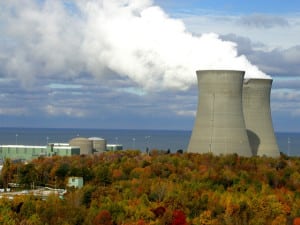Analysis Shows U.S. Nuclear Plants Losing $2.9 Billion Annually
Increased use of less-expensive natural gas and renewable sources of energy for power generation is putting financial pressure on U.S. nuclear power plants, according to an analysis of electricity costs from Bloomberg New Energy Finance (BNEF).
Nicholas Steckler, an analyst for BNEF, in a June 14 report said nuclear operators are losing about $2.9 billion a year. Steckler said nuclear plants are being paid $20/MWh to $30/MWh for their electricity, while their generation costs an average of $35/MWh.
The report says 34 of 61 U.S. nuclear plants are in the red. Steckler specifically cited merchant nuclear plants owned by FirstEnergy Corp., Entergy Corp., and Exelon.
In a statement, Entergy said it would not comment on individual plants but said "financial challenges due to sustained wholesale power price declines and unfavorable market conditions" are affecting the profitability of its nuclear operations. The company said it is now concentrating on its regulated utility business. Entergy, along with its wholesale commodities division, owns seven U.S. nuclear plants and manages another.

The Perry Nuclear Generating Station on Lake Erie, northeast of Cleveland, Ohio, is among the FirstEnergy plants struggling financially. Source: NRC
FirstEnergy, which has two nuclear plants in its home state of Ohio and one in Pennsylvania, reiterated previous public statements that its "competitive subsidiaries are not profitable, which includes all of our competitive generating plants." The company has continued to say it may leave competitive power markets by the middle of 2018.
Exelon, which has 23 reactors at 14 plants in six states and is the largest U.S. nuclear operator, did not immediately comment on the report.
Nuclear power has struggled on many fronts in recent years in the U.S. The construction of new reactors has been plagued by delays and cost overruns, though Georgia Power's troubled Vogtle project may have received a lifeline earlier this month when Toshiba, parent company of Westinghouse, a partner in the project, promised to pay Georgia Power $3.68 billion to help construction move forward.
Some nuclear operators are looking for government subsidies to level the field with renewables, but the legislation faces legal hurdles. New York and Illinois have passed legislation to subsidize the industry but a group of non-nuclear operators has sued to block its implementation. A Connecticut bill that would have supported the industry also was recently blocked.
FirstEnergy is trying to persuade Ohio lawmakers to mandate a customer surcharge to help its nuclear plants in the state, with debate continuing at the statehouse. Legislation also is being discussed in New Jersey and Pennsylvania.
Five U.S. nuclear plants have closed since 2013 and another six have plans to close by 2025, according to Environmental Progress, a group that supports nuclear power as a zero-emissions source of energy.
Steckler in his report noted that closing nuclear plants threatens U.S. targets for reducing carbon emissions from power generation. In fact, his report said that closing all the uneconomic U.S. reactors would "easily vanquish" emissions reductions achieved by the sector in the past five years.
-Darrell Proctoris a POWER associate editor (@DarrellProctor1, @POWERmagazine)
The post Analysis Shows U.S. Nuclear Plants Losing $2.9 Billion Annually appeared first on POWER Magazine.